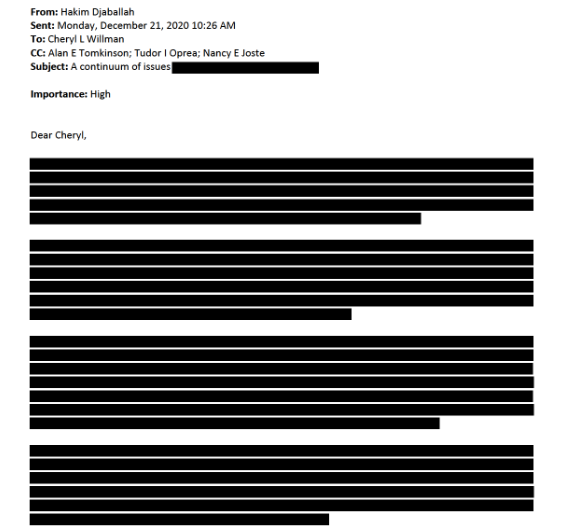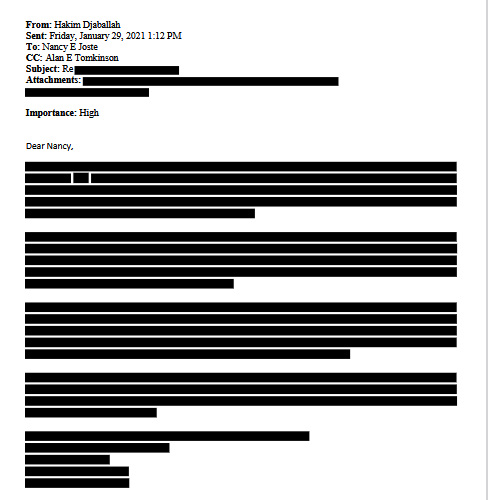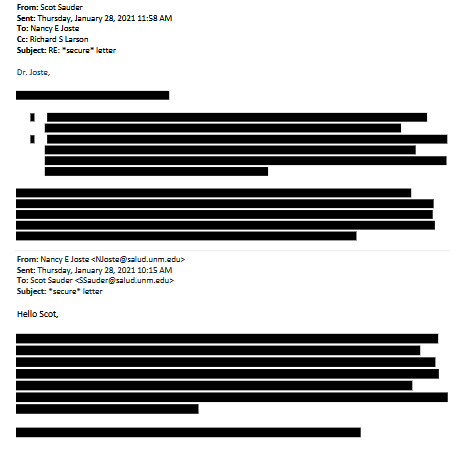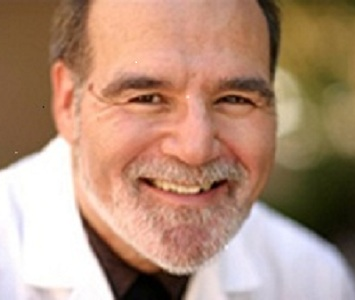UNM Won’t Release Key Documents That Led Regents to Use $2.1 Million in “Hush Money” to Settle Suit Alleging Lab Fraud, Bullying, and Mismanagement
UNM Lawyers Refuse to Release Original Letter Alleging Misconduct by HSC Officials and Federal Agency Letters Regarding Investigation – Heavy Reaction of Other Documents



Example of intensity of redactions regarding information UNM wants kept from public scrutiny.
Since October 14, 2024, The Candle has submitted several Inspection of Public Records Act (IPRA) requests to the University of New Mexico (UNM) regarding claims of fraud, abuse, mismanagement and alleged serious harm to patients at various health operations of the UNM Health Sciences Center (HSC).
This article is focused on the matter that the UNM Board of Regents recently paid more than two million dollars in hush money to keep the public from knowing how badly their highly paid leaders use the resources the state and federal government provide for them to do important research.
The Candle originally reported on the settlement of a lawsuit brought in the Second Judicial District Court for the State of New Mexico, by Hakim Djaballah, PhD., against the University of New Mexico Board of Regents, alleging violations of the New Mexico Whistleblower Protection Act.
The Board of Regents, through their publicly financed attorneys, insisted that after UNM had terminated Dr. Djaballah’s contract, despite him doing his job, they would pay him $2.1 million on condition that he can no longer speak about it.
The public deserves to know more. So here is the latest The Candle has turned up in our research.
It took two months to get the first batch of responsive records, and UNM continues taking its time in releasing more of the records that The Candle is aware exist based on information received from sources within and outside of UNM.
Much of what has been provided so far has been heavily redacted by UNM lawyers.
Four months since the original IPRA request, and The Candle is still waiting for a full response.
It appears that UNM lawyers are hunkered down redacting the hell out of information that likely should be available to the public.
The Candle anticipates challenging some of those redactions in Court if necessary, as well as any failure of UNM to produce records that we know exist.
Despite UNM’s Effort to Avoid Releasing Information, A Deep Dive Into Court Records Reveals Patterns of Abuse, Mismanagement and Possible Fraud by HSC Leaders
In late January, after scouring through many of the court documents filed by both Djaballah’s and UNM’s attorneys, The Candle filed another IPRA request seeking specific documents that UNM tried to have sealed by the Court and which were not sealed as the matter settled.
UNM flat out refused to release a copy of those documents claiming an exception under the IPRA statute to cover up what appears to be damaging information corroborating elements of Djaballah’s claims.
The Candle will include UNM’s refusal to release those records in our anticipated IPRA complaint to either the Attorney General or in a separate Court action.
Notwithstanding UNM’s efforts to hide the scandalous mismanagement and false representations made to the National Institutes of Health (which was funding research at UNM), The Candle was able to access the following information that supports the claims made by Djaballah in his Whistleblower suit.

UNM and Comprehensive Cancer Center Recruit Djaballah to Run Center of Molecular Discovery
Dr. Djaballah, an eminently experienced biochemist with almost thirty years of experience in drug discovery, development and executive management, was recruited to replace retiring Dr. Larry Sklar as director of UNM’s Center for Molecular Discovery (CMD).
The CMD, which had been run by Dr. Sklar for years, received most of its funding from the UNM Comprehensive Cancer Center, and its lab accommodations were provided the Pathology Department.
A critical mission of Sklar’s CMD was to discover new cancer-fighting drugs for use in the Cancer Center’s research and treatment operations.

According to Djaballah’s lawsuit, Cancer Center officials were heartened that he was willing to take over for Sklar, as the CMD had been in decline for several years – and as outlined in the lawsuit, many at the Cancer Center were “concerned that the CMD had been employing poor laboratory practices, such as failing to keep comprehensive records and allowing the lab to become a total mess, cluttered with old equipment.”
Djaballah began his duties in August 2020, and it did not take him long to witness for himself the concerns the Cancer Center scientists had about the CMD lab and its operations.
Among the problems Djaballah found and subsequently identified in his lawsuit:
- Failure to use formal lab notebooks in recording daily experiments – negatively impacting the integrity of the process and results.
- Lack of an electronic database for storing results of experiments.
- False representations by Dr. Sklar to the National Institutes of Health (NIH) that the “CMD maintained an electronic database, and that funding was required to compensate a particular CMD scientist to manage it.”
- Djaballah was concerned Dr. Sklar “had committed fraud by making the false representations to the NIH” in the grant requests, and that CMD’s poor data management violated NIH grant award terms.
- A review of CMD budget and pay records revealed to Djaballah that “some CMD scientists had been paid pursuant to funding for some projects for which they had not performed any work.”
Djaballah Alerts VP of Research at UNM Health Sciences of Concerns Regarding the Integrity of Research and Lab Practices Under His Predecessor, Dr. Larry Sklar

According to the lawsuit, when Djaballah reported his concerns to Dr. Nancy E. Joste, Chair of the UNM Department of Pathology, she ignored them.
Djaballah was so concerned about what he discovered he asked Joste for a letter confirming the problems did not occur under his watch.
While Dr. Sklar had retired, he was still involved at the CMD lab as a professor emeritus.
Djaballah’s attempts to deal with what he identified as misconduct by Sklar and the lab’s poor practices did not set well with the CMD and Pathology Department personnel.
In addition to the disorganization he found at the CMD lab, Djaballah also discovered that data and presentation that was used in the development of a a professional article authored by Sklar and another scientist at CMD did not seem to comport with their conclusions.
Concerned, Djaballah wrote to the Vice President of Research for the UNM Health Sciences Center, Richard Larsen, MD, identifying concerns regarding the integrity of the CMD practices.
(He listed those concerns in his whistleblower lawsuit as follows:)
- CMD Scientists did not maintain lab notebooks or electronic databases violating HSC and NIH data retention policies, and contradicting CMD’s representations in NIH grant applications;
- Two CMD scientists (whom CMD still employed) had been paid out of grants for projects on which the scientists performed no work;
- Dr. Sklar misrepresented CMD data in the SLAS Discovery article to overstate the HT flow cytometry method’s efficacy, and Dr. Sklar’ sought additional research funding based on those misrepresentations; and
- Dr. Sklar and other CMD scientists were attempting to impede Dr. Djaballah’s efforts to perform his duties as CMD director in order to conceal their roles in misconduct.
According Djaballah and his lawyers, Dr. Larsen basically did nothing to address the issues of integrity and efficacy – he basically kicked it down the road, allowing Dr. Sklar and others to engage in a disinformation and retaliation campaign against Djaballah.
The lawsuit continues to lay out the retaliation Djaballah encountered from Sklar and those close to Sklar, culminating with Dr. Joste informing him that her department was terminating his contract.
Djaballah’s Concerns Validated by Highly Respected Cancer Leader and UNM Scientist
In documents filed during the life of the lawsuit, The Candle found correspondence from other UNM affiliated leaders and staff corroborating the concerns of Dr. Djaballah.
Below are some of what was unearthed.
Text from Dr. Cheryl Wilman
In a text to Dr. Joste on May 7, 2021, Dr. Cheryl Willman (who was the Director & CEO, UNM Cancer Comprehensive Cancer Center at that time) wrote of her concerns with Dr. Joste’s plan on terminating Djaballah’s contract:
“I am very uncomfortable with discontinuing him and his contract Nancy…[sic] he is doing well with many faculty. If we dismissed him I think there would be a lawsuit and he would have justification.“
Dr. Willman also wrote the following about Dr. Sklar,
“…but I also believe that Larry has been a tremendous problem as well…[sic] and I think there needs to be more recognition of that from Pathology. I think had Larry not remained – we would likely not have all of the problems we do now.”
Willman continues,
“I think CMD was frankly a mess, that projects had not been directed well for some time, and that the student/faculty projects were not well conceived or good projects or well mentored.”
“I think Larry has been uncomfortable that all of this dysfunction and poor quality operations were uncovered…[sic] but honestly, most of us have felt this was the case for the past several years.”
(The full copy of Dr. Willman’s text can be at the end of this article).
Dr. Willman left UNM’s Cancer Center later that year, to become Enterprise Executive Director, of the internationally acclaimed Mayo Clinic Comprehensive Cancer Center.
She is considered “an internationally renowned physician scientist and a pioneer in the field of cancer individualized medicine with a track record of innovation and successful translation of discoveries to clinical trials.”
Another UNM Research Doctor Confirms Djaballah’s Claims
In an email to the then Dean of the UNM School of Medicine, Professor Alan Tomkinson, PhD, of the Department of Internal Medicine and Associate Director for Basic Research, wrote:
“I am writing to express my dismay and concern about the treatment of Dr. Djaballah...
Tomkinson continued to write about how Dr. Djaballah was turning around the very poorly run research department – insisting on proper lab standards that Dr. Sklar had let slide.
“I have seen many laboratories and this was one of the worst … The lab was filthy and it appeared that the benches were never cleaned and that personnel simply moved to another bench when one was trashed. The CMD staff were resistant to Dr. Djaballah’s efforts to change lab practices to meet GLP [Good Laboratory Practice] standards …”
Related to the retaliation leveled against Dr. Djaballah, Tomkinson wrote,
“Having known Dr. Sklar for 10 years, his orchestration of a campaign to undermine Dr. Djaballah is entirely consistent with his pattern of behavior. I note that he refers to Nicole Hamblett, a cancer center employee who worked as his CMD manager and now works for Dr. Djaballah as a traitor…”
Tomkinson also noted that under Sklar, “there was a lack of transparency about the CMD finances, a situation that was aided and abetted by the pathology administration.“
Further along in the email to the Dean of the School of Medicine, Dr. Tomkinson described a situation that seems to be out of soap opera involving high school cliques and bullying by Dr. Sklar and his “group.” (A copy of the full email is below in the same document that contains Dr. Willman’s text.)
UNM Leaders Need to Clean up Their Behavior
The annual operating and capital budget for the University of New Mexico for fiscal year 2024-25, is approximately $4.355 Billion.
About 71% of that budget is controlled by the UNM Health Sciences Center (HSC) and the UNM Health System.
UNM, UNM HSC, and the UNM Health System employ more than 17,500 New Mexicans – doctors, researchers, professors, sport personnel, nurses, janitors, certified assistants, social workers, hospital housekeepers, communications and media representatives and so on.
New Mexicans Deserve better than the bullying and bad behavior of a favored few at the top.
More reporting to come about UNM medical leaders and alleged misuse of a relatively new medical device, that may have led to harm, including death, of patients under the UNM Health System’s care – also document information The Candle requested in an IPRA filing and that UNM lawyers are likely busy redacting.
Full Text and Email of Doctors Willman and Tomkinson, Retrieved from Court Filings.